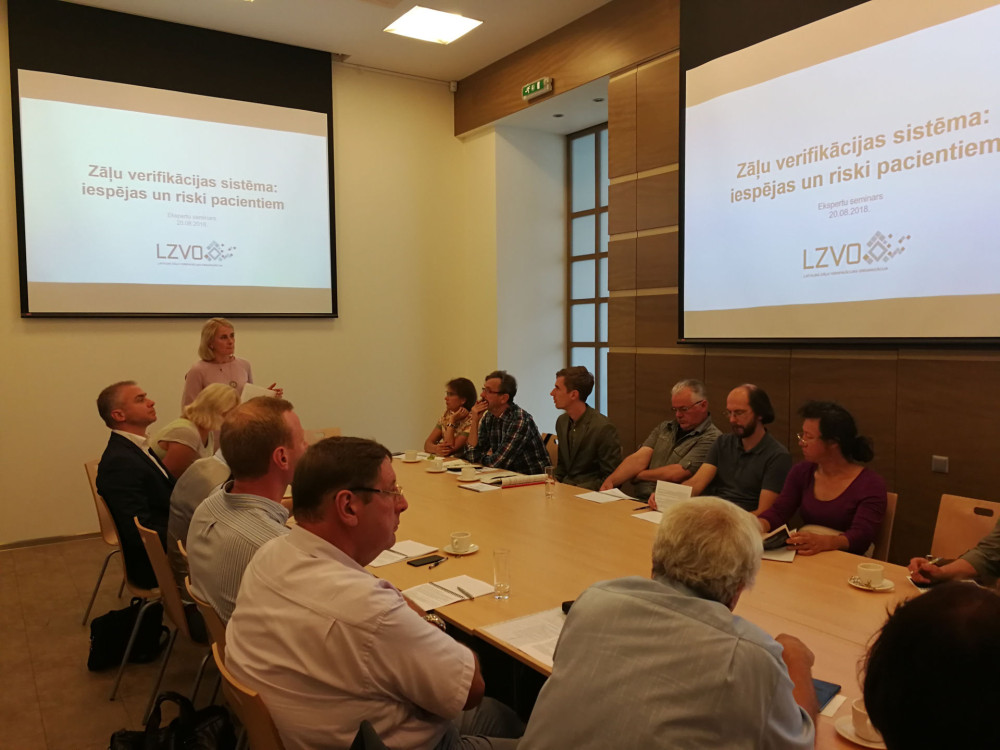
The Organization is worried about the impact of verification of medicines as carried out by the Ministry of Health on the patient health and safety
On August 20 the EU House held a seminar on the implementation of the Falsified Medicines Regulation and the approach of the Ministry of Health in introduction of the Regulation using an excessive number of exceptions.
Riga, August 20, LETA. The Employers’ Confederation of Latvia (EDL), the Latvian Chamber of Commerce and Industry (LCCI), and the Latvian Medicines Verification Organization (LMVO) are worried by the approach taken by the Ministry of Health (MoH) in the introduction of the European Union (EU) medicines verification regulation, as per experts from the said organizations who on Monday attended seminar “Medicines Verification System: Opportunities and Risks for Patients”.
The new Regulation on medicines verification will enter into force throughout Europe on the next year’s February 9, providing that from here on out all manufacturers of medicines will mark all packages with a unique identifier and, before handing medicines to patients, pharmacies and medical treatment facilities will have to check or verify the medicines. The purpose of the Regulation is to ensure that at the last stage of medicines delivery chain a patient receives verified and safe medicines. The Regulation is required because the number of falsified medicines in Europe constantly grows endangering health and life of patients.
In the today’s discussion, the current approach of the MoH in the implementation of the Regulation was criticized. The MoH seemingly intends that medicines in Latvia more often will not be verified, i.e. out of 3,722 medical treatment facilities only 28% will carry out verification purposes according to the Regulation. According to the Ministry’s plans, the verification will be carried out by pharmacies, hospitals, and outpatient treatment facilities, but not by general practitioner and other specialist offices, social care facilities, dentists, veterinaries, prisons and other establishments.
These plans were criticized by Pēteris Leiškalns, an expert of social affairs at the EDL. According to him, the Ministry has relieved too many institutions from the verification duty; furthermore, the verification of medicines is not that complicated to apply so many exceptions. Medicines can be verified in three ways: via a computer, mobile phone or scanner; moreover, you can verify medicines with a computer with no added costs.
Leiškalns explained intentions of the MoH to relieve general practitioners from the duty to verify medicines due to the Ministry’s “traumatic experience” with general practitioners who always react to any changes in an exaggerated manner. However, Leiškalns believes that no past experiences can be seen as a justification, and the sole exceptions can be applied in “emergency situations”.
Ingrida Circene, the former Minister of Health and a representative of the LCCI, stated that there should be no exceptions of medical treatment facilities, and she was also puzzled as to why the number of exceptions was so large.
Inese Erdmane, the chairperson of the LMVO, repeatedly emphasized that the organization does not support so many exceptions as they significantly endanger the patient health and fail to comply with requirements of the EU Regulation. Furthermore, the organization was worried about the fact that the MoH’s policy in the field could lead to a situation where there will be a larger number of available falsified medicines, making it possible for Latvia to become a major player in the trade of illegal medicines.
During the seminar sworn advocate Ieva Andersone from “Sorainen” stated that the large number of exceptions defined by the MoH fails to comply with the EU Regulation which states that exceptions should be narrowly applied, otherwise the fundamental principle of the Regulation – unified system throughout the EU and as small as possible chance to circumvent the medicines verification – could be endangered.
At the same time, Andersone argued that in Latvian situation it is not legally possible to define general practitioners as exceptions because, according to the Medical Treatment Law, the physician practices are medical treatment facilities and, therefore, an exception cannot apply to them.
The seminar was also attended by a representative of the State Agency of Medicines who was not able to justify the large number of exceptions. There was no representatives of the MoH at the discussion.
Published: 20.08.2018
LETA
